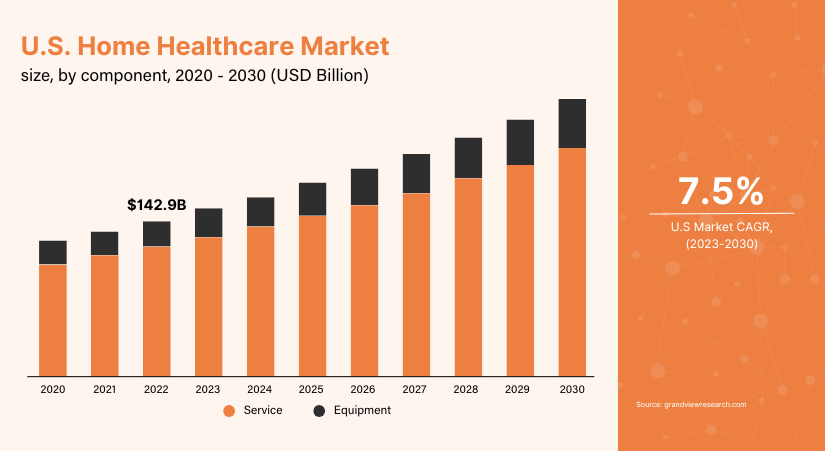
With the ever-increasing demand for home care, agencies face new challenges and opportunities. Undoubtedly, the comfort and familiarity of the home have become more essential to seniors requiring care. Agencies need to change their traditional caregiving model to effectively respond to new caregiving trends of niche specialty caregiving and stand out in the market.
If you’re nodding yes, read on!

Specialty caregiving services are growing within the U.S. According to recent reports, more than 11,400 home care agencies are spread nationwide with new expansion toward meeting complex medical needs. Many of these now specialize in services directed toward the complex needs of their patients, including services for Alzheimer’s disease and cardiovascular conditions, among others (CDC).
This includes primary and specialty care integration that is increasingly focused on improving the quality and efficiency of care for high-need populations. Compared to 2000, about 50% more specialists are being referred today, which shows a shift toward more personalized and targeted care (Centers for Medicare & Medicaid Services).
As these caregiving trends become established, even more agencies will look to add specialty care services that are in keeping with emerging healthcare models of personalized and coordinated care.
Specialty caregiving allows agencies to meet specific client needs, thereby ensuring improved outcomes for care and differentiating them from others in a competitive marketplace. Key areas of interest include:
Agencies help patients understand and interpret symptoms, administer drugs, and educate them on diabetes, heart diseases, and chronic respiratory disorders.
This involves minimizing suffering and palliating people with life-limiting illnesses and their families, managing pain and other symptoms, and providing psychological and spiritual support.
A specialized program for a patient with cognitive impairment includes provided activities, safety measures, and caregiver education.
Specialized care for children or infants with complex medical needs requires special training and services, including skilled nursing, therapy, and family support.
Staff Training and Education:
The carers need to receive training about certain diseases and conditions. They should also know cultural beliefs and practices to give the best care to all their patients. Otherwise, they may need more than the total needs of the patients.
Resource Distribution:
Specialty care often leads to the rearranging of one’s resources. Agencies must reconfigure the number of employees available for work, the amount of equipment they can utilize, and how to manage their time more effectively. However, this must be done delicately because they must ensure that all their clients, not just the special ones, receive what they deserve.
Coordination of Care:
Things get difficult to manage whenever a patient requires care from several providers. Health workers who attend to the patient have to communicate well with each other. If they do so, things will be recovered and noticed, reflecting the quality of care.
This means that agencies must understand and respect the differences in cultures, languages, and traditions. Not training caregivers to work with diverse backgrounds can create misunderstandings and awkward feelings in patients. Agencies have to take into consideration the needs of clients coming from other cultures for effective care.
Patient Condition Changes:
Patients’ circumstances change over time, and their conditions may change, so the caregivers must constantly alter their approach. Agencies sometimes require assistance adapting to the alterations on a short scale when it requires complex or unusual cases.
Emotions and Mental Well-being Counseling:
Specialized care isn’t the care of the body alone. Agencies must take care of the patients’ and caregivers’ emotional and mental health. This is a normal aspect that can easily be overlooked, but only if the agencies are supposed to care for the patient in every aspect.
Financial Constraints:
Specialized care is expensive. Organizations usually need professional experience in budgeting for such additional resources, personnel, and education. Such funds to provide the care they require are often a tough challenge when other programs must be cut back because of funding.
Compliance with Regulations:
There are many forms of specialty care, and each may have its rules and regulations. Agencies must adhere to all local, state, and federal laws. There is an overwhelming number of regulations that change constantly, thus taking up extra time and resources.
One concrete way agencies can start adapting today is to include specialist modules in the caregiver training program. For example, courses on dementia care, chronic disease management, and cultural sensitivity will prepare caregivers for the complex needs of contemporary clients. This provides an immediate shift in caregiver training, positioning caregivers ahead of client needs and thus increasing their confidence and competence in carrying out specialized care tasks. Continuous learning fosters care outcomes and better workforce values and support.
To implement this solution, agencies should begin by focusing specifically on certain areas most in need of such special care. Start by focusing core topics on managing a client with Alzheimer’s or dementia and understanding cultural differences in caregiving training on certain chronic diseases, such as diabetes or heart disease. Plugged into the already existing curriculum, caregivers may feel more confident in their roles and better prepared to address the needs of their clients as they change.
At Learn2Care, we arm you with the tools to do this now. Our online caregiver training platforms contain accessible, web-based courses to enhance caregivers’ skills in key areas, so you can be assured that your caregivers are giving quality care and are in compliance with federal and state regulations, so you will not face problems relating to regulatory compliance.
Benefits Agencies Can Get with Us
Start today by integrating Learn2Care’s specialized courses into your caregiver training program. By prioritizing advanced caregiver training, you’re enhancing the quality of care you provide and ensuring your workforce is well-prepared for the future of caregiving.
Technology can improve specialty care by making communicating, monitoring, and coordinating care easier.
You can collaborate with healthcare experts and organizations for specialized knowledge and resources. This could mean working with doctors, therapists, or community groups to create personalized care plans for clients. By forming partnerships, you can give better care and support to their clients.
To provide good specialty care, you must meet quality and safety standards. You can follow the rules and best practices and regularly check their performance. Focusing on quality and compliance can give clients and families confidence in their services and show they’re committed to excellence.
Specialty caregiving will change for the better as agencies adapt and begin to meet client needs. Those offering better and more affordable care shall be on top of the list within the next few years for those using AI, virtual care, and personalized training. AI shall create better care plans and see the needs of the patients. Virtual care will allow patients to get medical advice from the comfort of their homes and never have to visit a doctor’s office. Personalized training will help caregivers develop skillful training for particular client needs. With these changes, a better future of caregiving lies ahead that could now improve the well-being of caregivers and clients.
Contact us to inquire about our state-wise training courses and take the first step towards upskilling your team with a 14-day free trial!